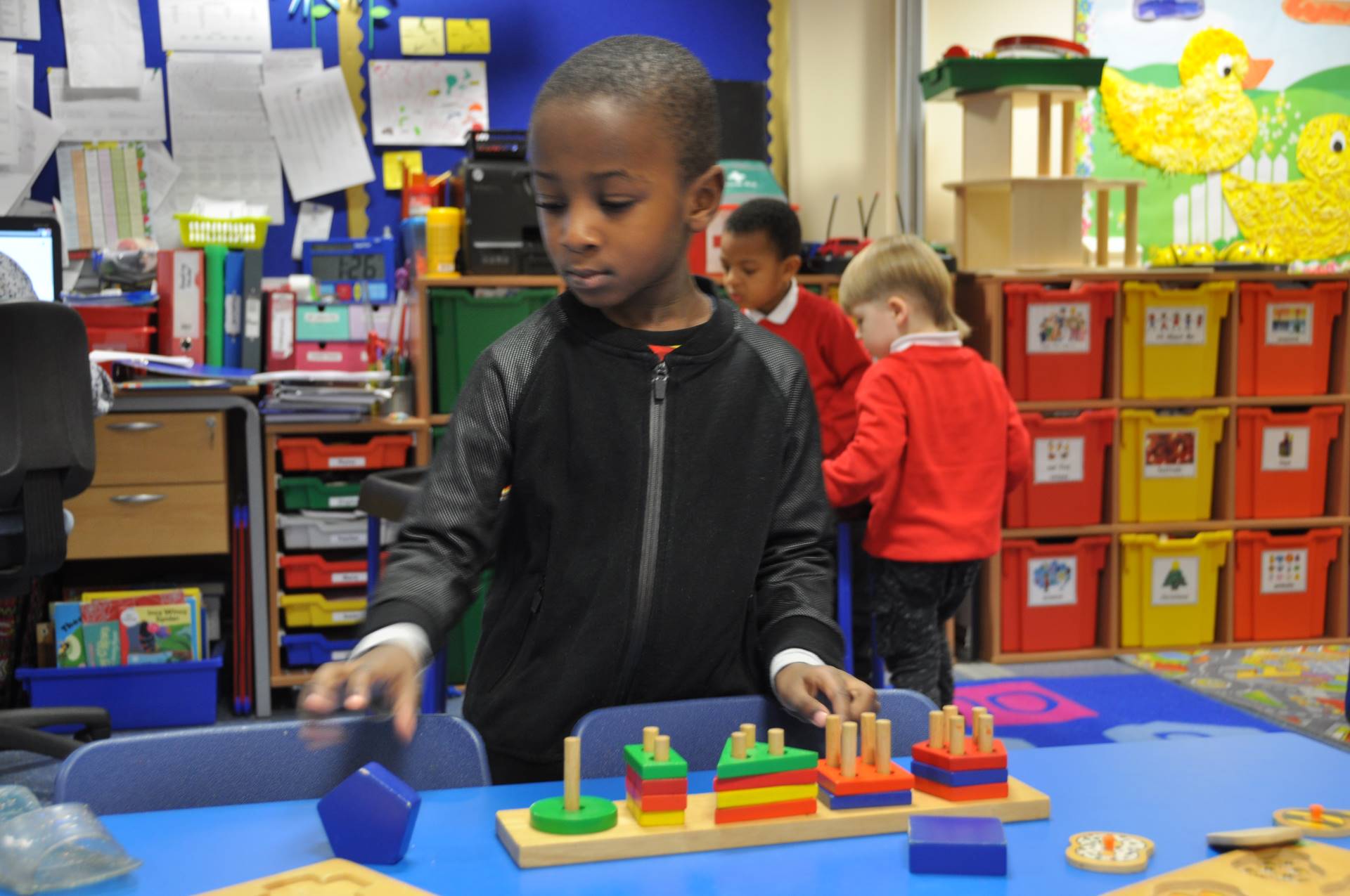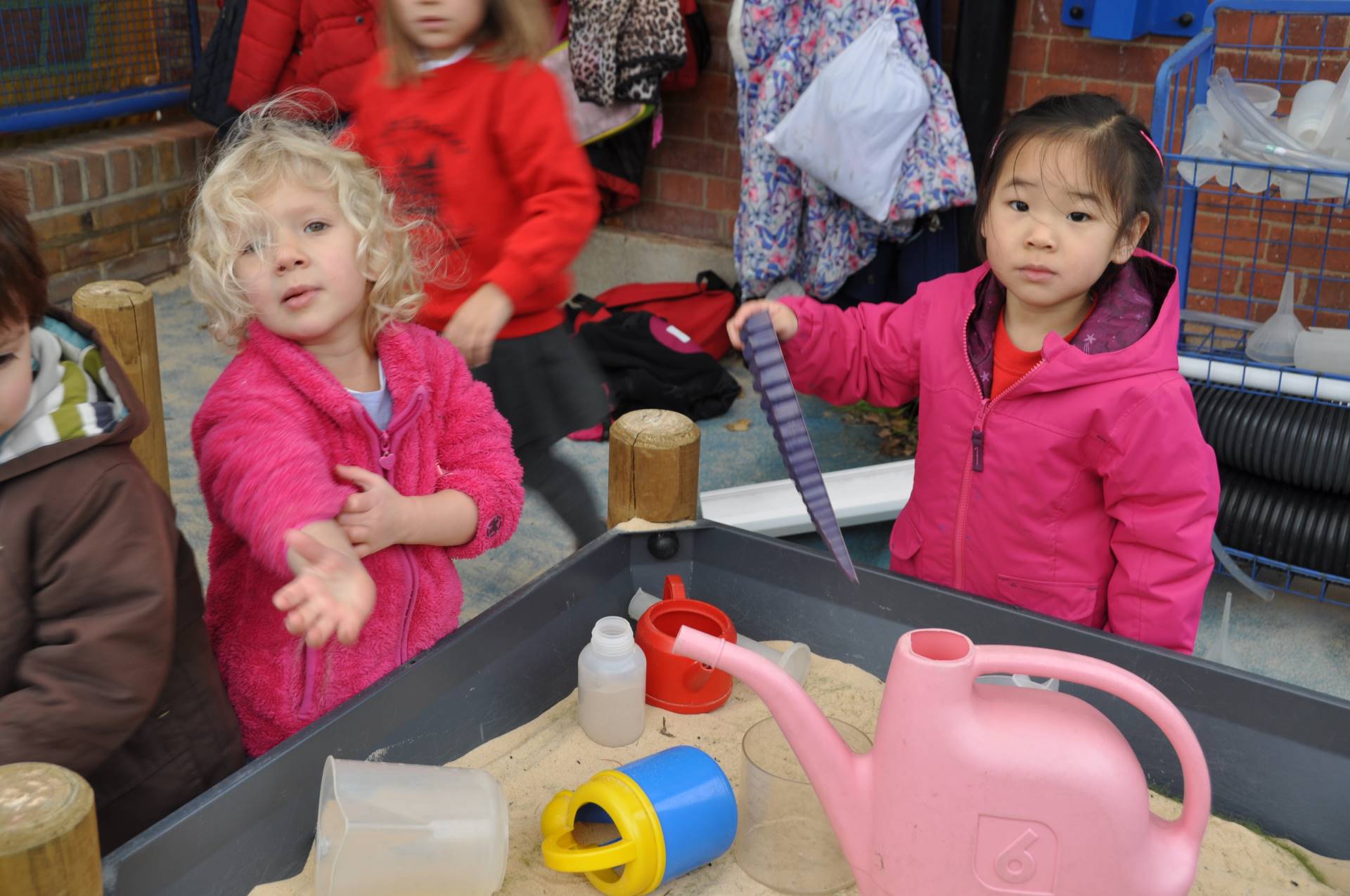Nursery
Our staff consists of Jan Ransom, (who is also our Early Years Leader), supported by Lisa Tucker, Jacqui Sharkey and Maria Bassett. Mark Crabtree does PPA cover on a Monday morning.

The Nursery curriculum and planning is based on the seven areas of development in the EYFS Development Matters document. Our main focus is on Personal, Social and Emotional Development, Physical Development and Communication and Language so that the children can form relationships with the staff and other children, as well as increasing their resilience and the confidence to express their feelings and ideas.
 The children learn about the world around them by engaging in activities linked to the terms topics. These experiences can be through role play, art, music and dance, using technology, cooking and planting seeds. We also place a great value on learning through play in the areas of Literacy and Mathematics. We are very lucky to have a fantastic outdoor space where the children’s Physical Development can be extended.
The children learn about the world around them by engaging in activities linked to the terms topics. These experiences can be through role play, art, music and dance, using technology, cooking and planting seeds. We also place a great value on learning through play in the areas of Literacy and Mathematics. We are very lucky to have a fantastic outdoor space where the children’s Physical Development can be extended.
Each child’s progress is recorded in their Learning Journey books using photographic observations and other examples of their learning. The children explore through creative activities, technology and through learning about the world around them. All the classrooms have displays of the children’s work and we are very proud to be able invite the parents, and significant adults in the children’s lives, to our Open Mornings each term which provides an opportunity for the children to show their work.

Each child’s progress is recorded in their Learning Journey books using photographic observations and other examples of their learning. The children explore through creative activities, technology and learning about the world around them. All the classrooms have displays of the children’s work and we are very proud to be able invite the parents, and significant adults in the children’s lives, to our Open Mornings each term which provides an opportunity for the children to show their work.
Autumn
 The children will initially settle in and begin to form relationships with the staff and the other children. During this time we ask that an adult stay with the child until they are ready to engage in the setting independently - the length of time that this takes will depend on the child and we assess and support this process on an individual basis. When the children are settled they will be observed and an assessment will be made about their development. Based on this assessment a decision will be made whether additional support through our Talking Tigers intervention groups will be made. All the children will be taking part in daily phonics sessions using the DfE Letters and Sounds program activities to promote speaking and listening skills.
The children will initially settle in and begin to form relationships with the staff and the other children. During this time we ask that an adult stay with the child until they are ready to engage in the setting independently - the length of time that this takes will depend on the child and we assess and support this process on an individual basis. When the children are settled they will be observed and an assessment will be made about their development. Based on this assessment a decision will be made whether additional support through our Talking Tigers intervention groups will be made. All the children will be taking part in daily phonics sessions using the DfE Letters and Sounds program activities to promote speaking and listening skills.

During this term they will also be taking part in The Institute for Neuro-Physiological Psychology program which helps to identify signs of neuromotor (nerves and muscles) immaturity which can be an indicator of specific learning difficulties and behavioural problems which when identified can be supported through daily physical exercise.
Spring
At the start of the Spring term all the children are given soundstrings following the progression of letter sounds in the phonics program and a workshop is run for parents and carers to attend to find out how we deliver the teaching of phonics. The children start to engage in WriteDance classes  which is a program of movement and mark making exercises set to music to practice using large motor skills to practice correct pencil grip to make large circular, straight, wavy and zigzag lines.
which is a program of movement and mark making exercises set to music to practice using large motor skills to practice correct pencil grip to make large circular, straight, wavy and zigzag lines.
Summer
Our topics this term will encourage the children to explore more about the natural world. During this term some of our children will start to take part in the next phase of the phonics program, and for those who have made significant progress in learning letter sounds, they will be introduced to books with very simple sentences using the sounds that they have learned. This will in turn help them to develop the ability to segment and blend letters in words. The second half of the term is an important time to prepare the children for their transition into Reception and they will engage in a lot of activities and carpet sessions to support this.
Parents/carers
To build home to school partnerships the Nursery class asks that the adult who brings the child to school helps them to either choose a book for Home Reading or supports them to write their name every other day. We also run weekly Stay and Play sessions to provide the opportunity for any adult involved in the child's life to come and spend some time with them and get to see firsthand what activities and resources the children are accessing.
Talking Tigers
This intervention program is based on the research found in 'Developing Language and Communication Skills through Effective Small Group Work' (Nash, Lowe and Palmer 2011) and consists of a range of play activities carried out by trained practitioners to support good practice to develop the children's speech, language, communication and behavioural skills. The sessions outlined in the program are aimed at supporting Nursery aged children and continues through to Reception aged children.
The Nursery class goes on educational school trips and we are always grateful for the help we receive from family members and carers to support this.

